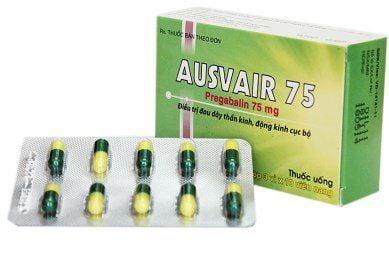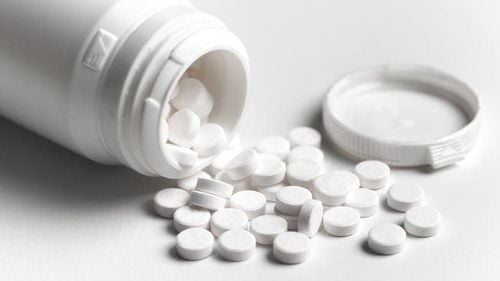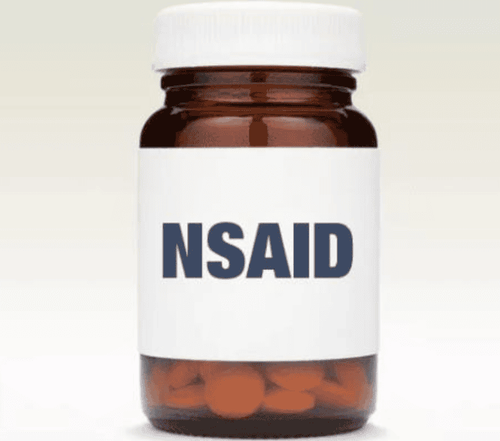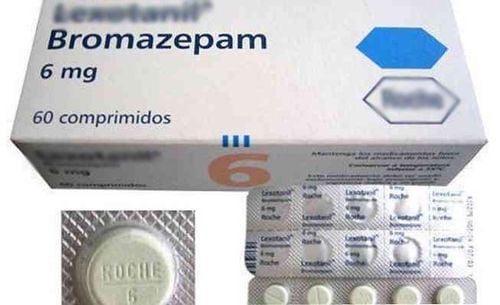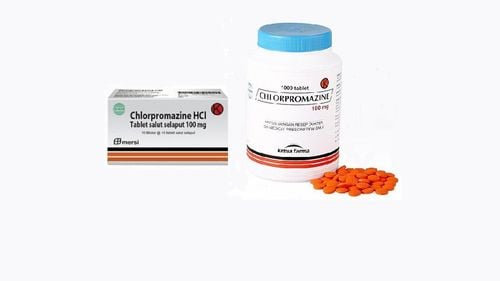This is an automatically translated article.
Levopatine has the main ingredient Levomepromazine 50 mg. It is an antipsychotic drug with analgesic and anti-nausea properties. Besides the benefits, the drug also brings many unwanted side effects.
1. What does Levopatine do?
The doctor will prescribe the drug in the following cases:
Used as a pain reliever for moderate to severe pain, especially in cases where the pain is so excessive that the patient does not go can again. Levomepromazine is also used in low doses to treat nausea and insomnia. Levomepromazine is used to treat psychosis, especially schizophrenia and the manic episodes of bipolar disorder.
2. Dosage and how to take Levopatine
How to use:
The drug is prepared in the form of film-coated tablets, used orally. The time to take the drug is to take it with a meal.
Dosage:
In adults and adolescents: In the treatment of schizophrenia and severe pain use a dose of 25-50 mg/day, divided into 3 oral doses. Doses taken during the day do not need to be evenly divided, higher doses can be used in the evening.
In the treatment of sedation and moderate pain, use a dose of 6-25 mg/day, divided into 3 oral doses.
For children under 10 years old:
Treatment of psychosis, moderate pain, sedation: Use the initial dose of 0.25 mg/kg/day divided into 2 to 3 times with meals. Then the next dose will be gradually increased if necessary and the patient's body can tolerate the drug. Note that the dose should not exceed 40 mg/day in patients under 12 years of age.
Elderly : Use 1/2 the usual dose for adults.
Note: For people with physical mental illness or in a state of mind that is not clear or confused, use a therapeutic dose equal to 1/3 or 1/2 of the usual dose for adults. It is possible to gradually increase the dose at a later time, but at least 2-3 days, the best time to change the dose is 7-10 days.
Contraindications
Do not use the drug in patients sensitive to phenothiazines Do not use the drug in patients with heart disease, severe liver failure, kidney disease or people with a history of seizures Avoid overdose of barbiturates, opiates or alcohol No Use the drug when the patient is in a coma Do not use the drug in a person with leukopenia or a history of agranulocytosis. Patients with myasthenia gravis Patients with hypersensitivity to any component of the drug.
3. Overdose and how to handle Levopatine
Manifestations: When using an overdose of the drug, patients will experience the most common reaction is central nervous system depression with ataxia, dizziness, unconsciousness, convulsions, respiratory depression, sleep. chickenpox, tachycardia, arrhythmia, infrequent reactions such as extrapyramidal symptoms or hypotension, neuroleptic malignant syndrome.
Treatment: The doctor will usually appoint the patient to wash the stomach with activated charcoal, support breathing and adjust the acid-base balance, anticonvulsant by using Diazepam drug for the patient. When experiencing extrapyramidal symptoms, biperiden is indicated. Electrocardiogram monitoring. Antiarrhythmic indicated to use thioridazine drug. For patients with hypotension will give intravenous fluids and dopamine, dobutanmin, noradrenalin.
4. Be careful when taking Levopatine
For people with epilepsy: Levopatine can lower the seizure threshold, so it is necessary to be careful in using the drug in these cases.
For patients with hyperglycemia: Patients diagnosed with diabetes or at risk of diabetes should regularly check blood glucose levels during the treatment period.
For patients with venous thromboembolism: Patients using antipsychotic drugs often have an increased risk of venous thromboembolism, so it is necessary to take preventive measures during treatment.
Care should be taken when using the drug in patients at risk of stroke, with an increased risk of death in the elderly.
Use of drugs that may increase the risk of QT prolongation.
Use with caution in elderly or debilitated patients who may, with heart disease, cause reactions causing severe hypotension. When medication is needed, the patient should reduce the dose of the drug at the first dose, then gradually increase it with subsequent doses. However, regular monitoring of pulse and blood pressure is required.
When using high doses of the drug, the patient should lie in bed for 1-2 hours after taking the drug to avoid orthostatic hypotension.
For pregnant women: The doctor recommends that in this case, it is necessary to note and limit the use of Levopatine, especially in the last 3 months of pregnancy. Because the drug increases the risk of adverse reactions on the nervous system as well as causing jaundice in the newborn.
During lactation: When using the drug to relieve pain in the case of a mother in labor, the drug can be excreted in breast milk, but the amount of the drug is insignificant, so the drug may not affect the breast milk. baby.
Do not use drugs with people who are operating machinery or driving.
5. Unwanted side effects when taking Levopatine
The side effects that the drug brings are similar to the ADRs of many other phenothiazines, but the orthostatic hypotension reaction occurs more severe and more frequent.
Common reactions:
Orthostatic hypotension, palpitations, tachycardia, QT interval prolongation causing arrhythmia. Having extrapyramidal syndrome with manifestations such as restless standing, tremor around the mouth, dyskinesia, acute dystonia, Parkinson's syndrome. Autonomic nervous system reaction with symptoms such as urinary retention, constipation, somnolence, dry mouth. Skin side effects: Sensitivity to photos, hypersensitivity reactions (edema, congestive spots, urticaria, maculopapular) skin rash. Respiratory effects: Nasal congestion, nasal congestion Uncommon reactions: Disruption of accommodation, endocrine reactions (causes gynecomastia in men, weight gain, changes in physiological needs), reactions urogenital reactions (causing difficulty urinating), gastrointestinal reactions (vomiting, nausea, stomach pain), neuromuscular reactions causing tremor symptoms.
Rare side effects: Neuroleptic reactions causing neuroleptic malignant syndrome, hypothermia, lowered seizure threshold, skin reactions such as gray-blue tint, endocrine reactions ( If the patient experiences any of the above reactions, it is necessary to immediately notify the doctor or pharmacist for timely handling measures. and treatment, avoid long-term and cause unwanted consequences.
6. Levopatine drug interactions
When the drug is used together with antihypertensive drugs, there is a risk of severe hypotension. Co-administration with anticholinergics enhances the effectiveness of anticholinergics and succinylcholine muscle relaxants. Concomitant use with drugs metabolized through P540 2D6 will cause toxicity to the nervous system. Do not take the drug with alcohol. Concomitant use with diuretics will cause hypotension and increase the risk of orthostatic hypotension. Concomitant administration of potent neuroleptic ophthalmic drugs may induce transient cerebral metabolism, resulting in loss of consciousness within 2-3 days. Concomitant use with drugs that prolong the QT interval such as disopyramide, quinidine, amiodarone, antibiotics such as sparfloxacin, moxifloxacin, IV erythromycin, other neuroleptics such as phenothiazines, pimozide and sertindole, antihistamines, antimalarial drugs may increase the risk. arrhythmia. The above is important information about Levopatine, if in the process of use need more advice, patients can contact their doctor, pharmacist for more specific advice.
Please dial HOTLINE for more information or register for an appointment HERE. Download MyVinmec app to make appointments faster and to manage your bookings easily.




